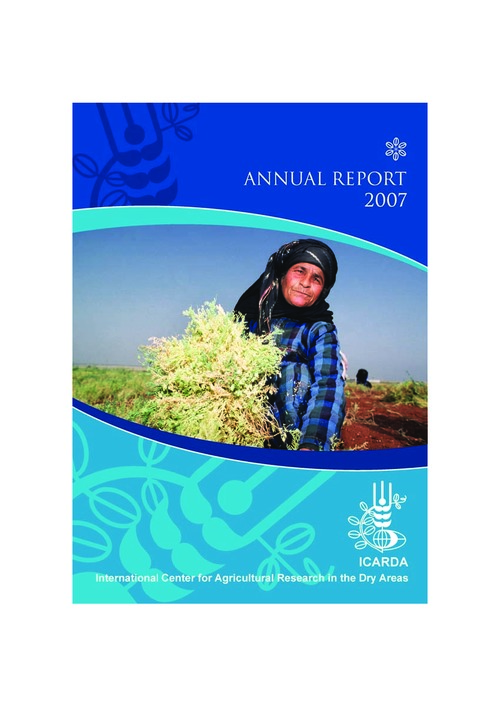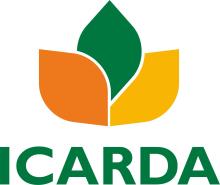Resource information
In 2007, ICARDA celebrated its thirtieth anniversary. The Center and its partners have worked together for three decades to improve the food security and livelihoods of the poor in dry and marginal areas. During this time, we have seen significant changes in the biophysical environment and in socio-economic circumstances. New farming technologies, new livelihood options, and better policies and institutions are speeding up agricultural development in the world's dry areas, and we are proud of the role we have played in this progress.
During ICARDA's Presentation Day held in May 2007, the Center's achievements over the last 30 years were presented to ICARDA's partners – national research and academic institutions, donors, farmer groups, civil society organizations and others. ICARDA's mandate is as relevant today as it was when the Center was established in 1977. The Center's core mission – research for agricultural development – remains unchanged, but the research agenda has evolved in response to new challenges and changed circumstances. The aim has been, and still is, to conduct demand driven research, to solve those problems that our clients consider important. So, as ICARDA begins its fourth decade, we are increasingly focusing on the pressing challenges of climate change, desertification and rising food prices.
ICARDA's new Strategic Plan for 2007-2016 sets the direction for our response to these challenges. The new plan emphasizes continuity within change: building on our experience in the Central Asia and West Africa (CWANA) region, and widening our scope to include dry areas globally. The plan envisages that we and our partners will be actively involved at every stage in the research-development continuum – strategic research, adaptive research, technology transfer, and
impact monitoring. We thank all our partners for committing so much time and energy in helping us develop the new Strategic Plan. We commend staff, too, at all levels, for their commitment and hard work. We are also grateful to the members of the two external review panels (External Program and Management Review, and Center-Commissioned External Review on Management and Finance) for their inputs into the process. ICARDA's program structure has been streamlined, and we have recruited topnotch staff to strengthen research in specific areas and to reinforce our
management team.
Successful research-for-development depends on collaboration with all stakeholders, particularly with national agricultural research systems. During 2007 we broadened our already extensive network of partnerships, and strengthened ties with a number of advanced research institutions. For example, agreements signed with institutions in Australia, Germany, Japan and Spain will improve our strategic research as well as our capacity development programs. New agreements with developing-country governments have broadened the reach and the impact of our work at the farm level. We greatly value our relationships with national research systems, as they are an endorsement of our scientific reputation and our commitment to national agricultural development.
New strategic research partnerships entered into in 2007 reflect ICARDA's increasingly global thrust. The Global Rust Initiative, led jointly by ICARDA and CIMMYT, aims to combat a new race of wheat stem rust disease that has already spread from East Africa into West Asia, and now threatens wheat production in other parts of Asia, the Mediterranean, and even the Americas. ICARDA is a partner in another initiative: the Global Crop Diversity Trust genebank in Svalbard, Norway, which will hold the world's largest collection of seeds, and play a key role in conserving global crop genetic diversity. ICARDA will continue to strengthen its research and capacity development programs, to help farmers in dry areas cope with climate change. Our integrated approach combines adaptation, mitigation and ecosystem resilience. Improved crop varieties hold the key to adapting to climate change, improving food security and arresting the upward spiral of food prices. During the year, as many as 26 new varieties, developed from ICARDA germplasm, jointly by the Center and national research programs, were released in 12 countries. They include varieties of wheat, barley, lentil, chickpea and forage legumes, with various trait combinations, such as high yield, drought/cold tolerance, disease resistance, and suitability for mechanized production. There were many other highlights. For example, ICARDA scientists have developed new, rapid, low-cost techniques, using GIS tools, to map agro-ecological zones for better research targeting in large and complex ecosystems. They have identified new biological control agents – using insect-killing fungi – and developed methods to protect wheat crops from the Sunn pest that reduce both pesticide use and production costs. Our biotechnologists are developing a new, robust approach to identify plant genes that confer resistance to drought and other environmental stresses. Farmer-participatory breeding, pioneered in the CWANA region by ICARDA, continues to spread to new countries, empowering resource-poor communities in remote areas.
Improved food legume genotypes have been developed with better nutritional quality (e.g. low levels of tannin, high content of micronutrients). Improved techniques for land and water management are helping to increase water productivity, make better use of scarce water resources, and even to rehabilitate degraded rangeland areas. Protected agriculture techniques are being introduced in Afghanistan, Yemen and the Arabian Peninsula, helping to conserve resources and improve farmers' incomes. Guided by the new Strategic Plan, the Center will now move forward, revitalized and equipped with advanced science and innovative ideas, to continue delivering world-class research products and international public goods to improve the livelihoods of poor farmers in non-tropical dryland areas worldwide.


